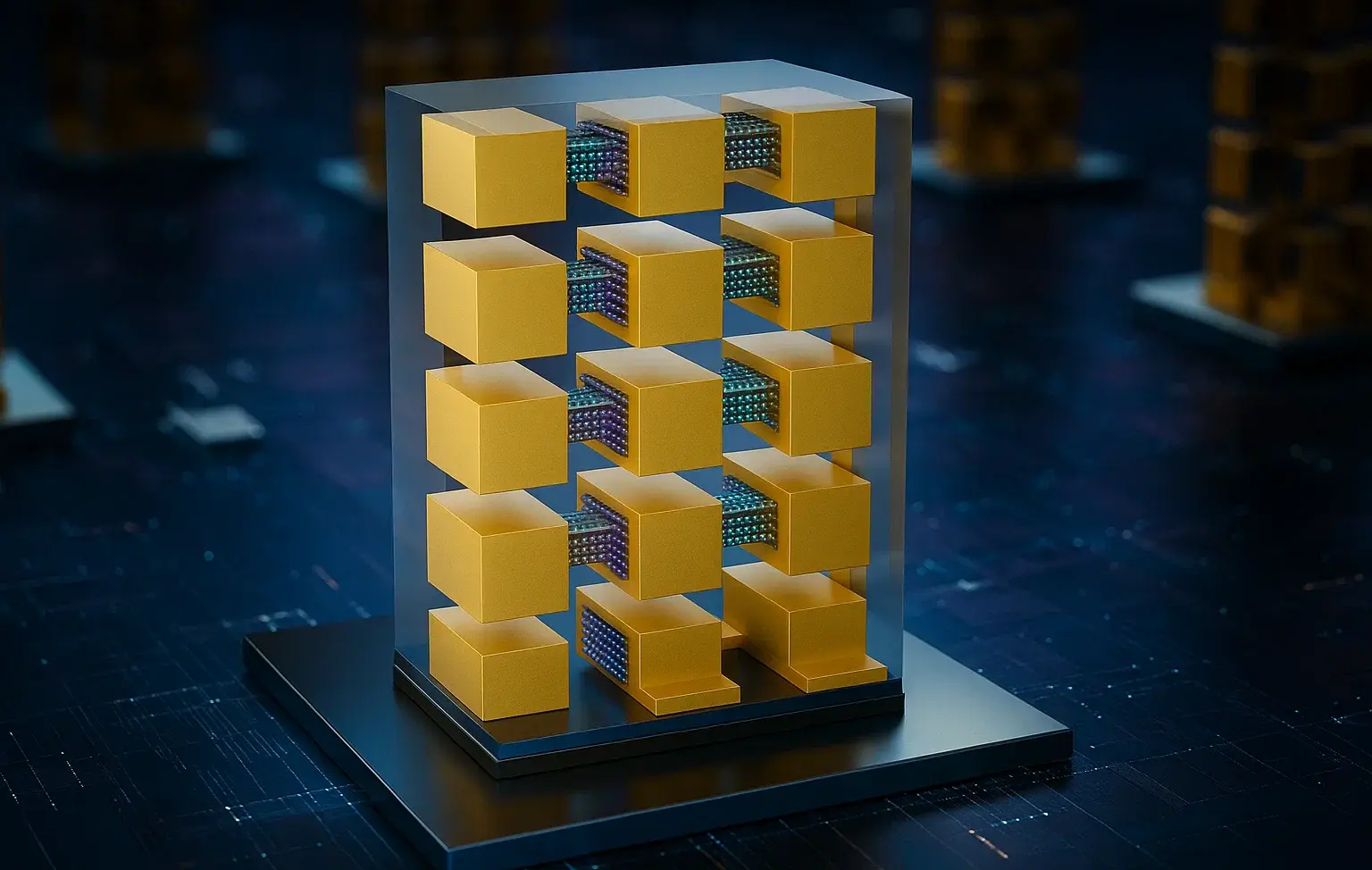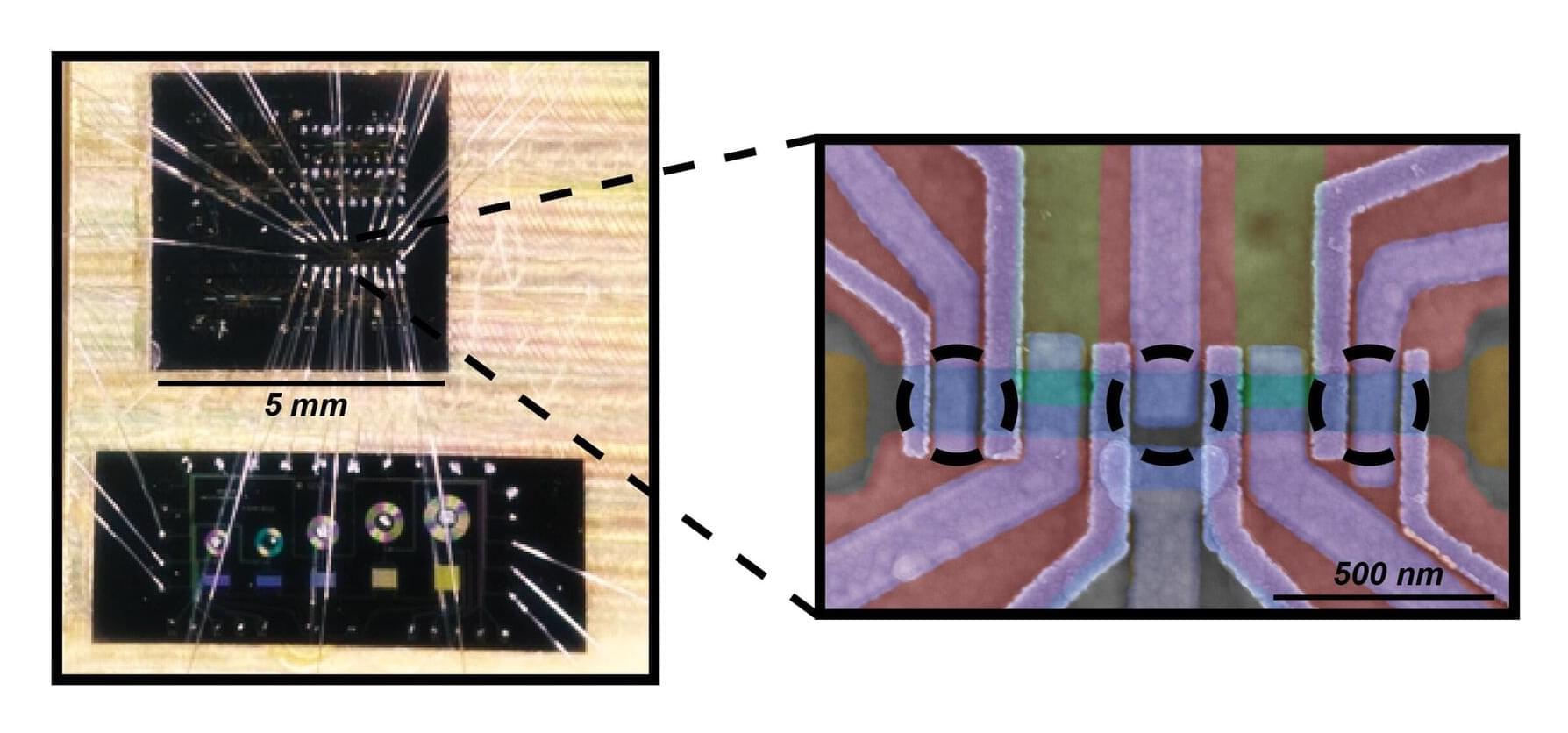The new transistor runs 40% faster and uses less power.




Researchers at QuTech in Delft have combined superconductors and quantum dots to observe and manipulate so-called Majorana bound states, which have properties that could enable stable quantum computation. By building a chain of three coupled quantum dots in a two-dimensional electron gas, they were able to demonstrate properties of Majoranas that are essential for the study of Majorana-based quantum bits.
The results are published in Nature.
One of the key issues in quantum computing remains the inherent instability of quantum bits. In the quest for fault-tolerant quantum computers, topological quantum bits are expected to be significantly less prone to errors. Key to these qubits are quasiparticles called Majorana bound states, which have been predicted to appear on opposite edges of one-dimensional superconducting systems.

Innsbruck physicists have presented a new architecture for improved quantum control of microwave resonators. In a study recently published in PRX Quantum, they show how a superconducting fluxonium qubit can be selectively coupled and decoupled with a microwave resonator and without additional components. This makes potentially longer storage times possible.
Microwave resonators are considered a promising building block for the development of robust quantum computers, as they store quantum information in more complex states. This simplifies error correction and allows significantly longer storage times.
“The storage time of quantum information of these microwave resonators has so far been limited by undesirable interactions with the superconducting qubits used to control them,” explains Gerhard Kirchmair from the Department of Experimental Physics at the University of Innsbruck and the Institute of Quantum Optics and Quantum Information (IQOQI) of the Austrian Academy of Sciences.

Interdisciplinary teams across the Quantum Systems Accelerator (QSA) are using innovative approaches to push the boundaries of superconducting qubit technology, bridging the gap between today’s NISQ (Noisy Intermediate-Scale Quantum) systems and future fault-tolerant systems capable of impactful science applications.
QSA is one of the five United States Department of Energy National Quantum Information Science (QIS) Research Centers, bringing together leading pioneers in quantum information science (QIS) and engineering across 15 partner institutions.
A superconducting qubit is made from superconducting materials such as aluminum or niobium, which exhibit quantum effects when cooled to very low temperatures (typically around 20 millikelvins, or −273.13° C). Numerous technology companies and research teams across universities and national laboratories are leveraging superconducting qubits for prototype scientific computing in this rapidly growing field.

Today, most of us carry a fairly powerful computer in our hand—a smartphone. But computers weren’t always so portable. Since the 1980s, they have become smaller, lighter, and better equipped to store and process vast troves of data. Yet the silicon chips that power computers can only get so small.
“Over the past 50 years, the number of transistors we can put on a chip has doubled every two years,” said Kun Wang, assistant professor of physics at the University of Miami College of Arts and Sciences. “But we are rapidly reaching the physical limits for silicon-based electronics, and it’s more challenging to miniaturize electronic components using the we have been using for half a century.”
It’s a problem that Wang and many in his field of molecular electronics are hoping to solve. Specifically, they are looking for a way to conduct electricity without using silicon or metal, which are used to create computer chips today. Using tiny molecular materials for functional components, like transistors, sensors, and interconnects in electronic chips offers several advantages, especially as traditional silicon-based technologies approach their physical and performance limits.

A UNSW Sydney mathematician has discovered a new method to tackle algebra’s oldest challenge—solving higher polynomial equations.
Polynomials are equations involving a variable raised to powers, such as the degree two polynomial: 1 + 4x – 3x2 = 0.
The equations are fundamental to math as well as science, where they have broad applications, like helping describe the movement of planets or writing computer programs.

Imagine having to find your way with only a compass and the stars and being handed a GPS. This is what David Marpaung and colleagues have just done for designers of light-based chips. Through their discovery of steering light with sound, the UT researchers have made available a powerful new tool to expand the scope and performance of this up-and-coming technology that’s quickly moving beyond its traditional use in low-power optical communication.
Detailed in Science Advances, Marpaung has essentially molded the precision and versatility of a well-known physical phenomenon called Stimulated Brillouin Scattering (SBS) into a form that’s ready for mass manufacturing.
Check out the free AMD loaner offer. Test the Ryzen PRO laptops yourself and experience the benefits they can bring to your business:
https://tinyurl.com/4zwaxnfm.
Timestamps:
00:00 — New Semiconductor.
05:53 — New Chip.
11:09 — Breakthrough Results.
16:28 — Major Fabs looking into it.
Let’s connect on LinkedIn ➜ / anastasiintech.
#AMD #RYZENPRO
